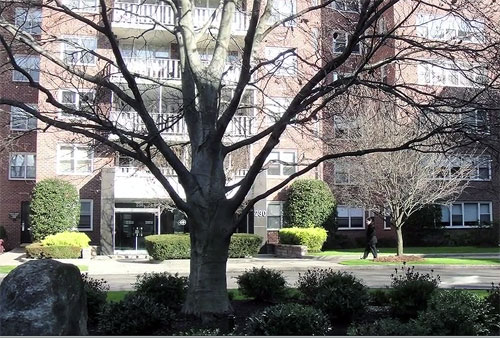HABITAT
A Co-op Slashes Water, Fuel & Upkeep Costs with an Energy-Efficient Boiler
Jennifer V. Hughes in Green Ideas on January 26, 2012

The High Cost of Water
Take a peek at the water issue: the first 500 units of water cost $2.54 per unit, according to the co-op's managing agent, Floyd Brigman, of Stillman Property Management. Every additional unit costs a staggering $8.89 each. Before the project was completed, Brigman says, the co-op had to buy 12,108 of those pricey units of water; after the project was done in 2010, they had to buy only 5,000 of the additional units.
Video
The existing HVAC system relied on what are known as absorption chillers for air conditioning. That means that in the summer, the boilers had to run in order to create steam, which drove the chilling system that provided cold water, which was then pumped into the units. Fans blowing on the chilled water coils in the fan coil units in each unit provided cool air. "It's a pretty inefficient system," says Omor Igiehon, executive vice president of Dynamic Energy Group, the contractor that installed the new equipment.
Instead, the new system has natural gas engine-driven chillers, manufactured by the Massachusetts-based Tecogen, that create the chilled water that cools the units. In the winter, the boiler system works more traditionally: The new energy-efficient boilers make steam, which is converted into hot water through a heat exchanger and then that hot water is pumped into each of units.
Putting Waste Heat to Good Use
One of the biggest bonuses is that the natural-gas-engine chillers create a significant amount of waste heat that is captured and used to heat water for shareholders' use, supplementing an existing natural-gas-fired hot water heater. The Garth Essex was able to provide about 80 percent of the needed hot water that way, says Nick Raad, principal of Ventrop Engineering Consulting Group, which designed the system.
The engine chiller system costs about $500,000, depending on the size, says Raad. But it's not a perfect fit for all buildings. In New York City, someone needs to be specially trained and certified by the fire department to maintain it. There is no similar rule in Westchester County.
At the Garth Essex, Kaplan says the co-op prefers gas over higher-priced oil for its new boilers (at right; click to enlarge). "The whole objective was to try to use equipment that would minimize fuel usage. Everyone saw that there was no way the price of oil or natural gas was going to go down any time soon."
Seven-Year Payback
When tackling a major project like this, Kaplan says, it was helpful for the board to form a subcommittee to devise the plans. Shareholders, he says, were understandably worried about cost. The board was familiar with incentives offered by the New York State Energy Research and Development Authority (NYSERDA) and joined into what was then called the Res Tech program, now known as the Multi-Family Performance Program.
The board continued with NYSERDA and eventually was able to get a cash incentive that covered 20 percent of the project's cost, because the co-op saved over 20 percent on energy bills. In all, Brigman says, the project will be paid off in about seven years through energy savings. To pay for the project costs not covered by incentives, the board took out a NYSERDA low-interest loan and tapped into its reserves. All the NYSERDA incentives were later used to rebuild the reserve fund, he says. (The board declined to detail exact dollar amounts for cost, savings and incentives.)
Kaplan says a key in tackling a big project like this one is to go for the best quality, not the cheapest price. "Sometimes you might want to go with the lowest bidder. You might think you can get away with saving that way," he says. "But on a project of this size that's not a good idea. You're better off if you have to spend a little extra money to get things done properly and in a timely fashion."
From the January 2012 issue of Habitat magazine. For print-magazine articles back to 2002, join our Archive >>



 View video now...
View video now...

